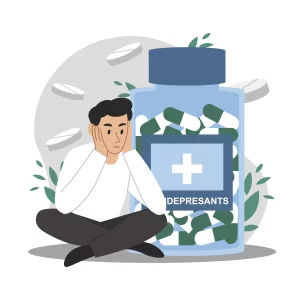If you’ve recently had the dosage of your antidepressant increased, you might be wondering, “how long for increased dose of antidepressant to work?” A lot of people ask this. Knowing the timeline helps us see what to expect from the treatment.
Let’s explore the determining elements for antidepressant success, and what’s usually expected when your dosage goes up.
What Are Antidepressants?

Antidepressants are drugs created to ease depression symptoms. Their function? Balancing neurotransmitters, brain chemicals that control mood and emotions.
Many kinds exist like SSRIs (selective serotonin reuptake inhibitors), SNRIs, and MAOIs. Each works uniquely, having individual effectiveness timelines.
Factors Influencing Effectiveness
Type of Antidepressant
Your drug type impacts how fast you’ll notice improvement. Prozac or Zoloft and SSRIs generally show full benefits in 4-6 weeks. Others may take more time.
Individual Response
Everyone’s body reacts to drugs uniquely. Your genetics, health state, and other drugs you’re on can influence your timeline to improvement.
Severity of Symptoms
How severe your depression is can also affect when you’ll see improvement. If your symptoms are light, you might notice positive changes sooner than those struggling with high-grade depression.
How Long for Increased Dose of Antidepressant to Work?
The Initial Weeks
In the initial weeks post-dosage increment, you may see subtle shifts. These could be better sleep, enhanced appetite, and a small energy gain.
4-6 Weeks
Around the four-to-six-week period, many will begin to witness more pronounced uplifts in their mood and general life perspective. This is usually when the medicine is at its peak effect.
Beyond Six Weeks
For some, benefits from a higher dosage might take more than six weeks to fully appear. If you haven’t observed any positive changes by then, it’s crucial to speak with your health professional about your medical strategy.
Tips for Managing Expectations
Be Patient
Give your body a chance to adapt to the medicine dosage. Fast-tracking might result in letdown.
Keep a Journal
Note down your symptoms. This helps your healthcare provider see the medicine’s impact. Jot down changes – good or bad. Discuss these at your next meeting.
Communicate with Your Doctor
Communicating with your healthcare provider regularly is key. They can tweak your treatment if needed, and guide you on what’ll happen next.
What to Expect When Increasing Antidepressant Dosage?
Common Side Effects
High doses might mean more side effects like feeling sick, shaking, big pupils, feeling anxious, restlessness, uncontrolled muscle twitches, sweating, or confusion.
Monitoring
Keep a close eye on changes in your symptoms or side effects. Let your healthcare provider know, so they can make sure the new dosage suits you.
Gradual Adjustment
Usually, dosages are increased slowly. It helps limit side effects and lets your body get used to it.
Individual Response
What helps one person may not help another. Treatment often needs tweaking to suit the individual. Always check with your healthcare provider before changing your medicine.
How to Tell if Your Antidepressant Dose Is Too High?
Too much antidepressant medication can lead to various symptoms and undesirable effects. Note these potential signs:
Serotonin Syndrome
When antidepressants are overused, you might feel anxious and puzzled, have a fast heartbeat, sky-high blood pressure, wide-open pupils, poor motor control, and excessive sweating.
Emotional Blunting
Sensing a lack of emotion or a disconnected feeling might mean your dose is a bit much.
Suicidal Thoughts
Oddly, antidepressants in high amounts can sometimes provoke thoughts of suicide, particularly in young adults.
Extreme Tiredness or Sleepiness
Feeling too tired or excessively sleepy may suggest an overdose.
Bodily Side Effects
Changes in your body might include feelings of nausea, light-headedness, trouble sleeping, dry mouth, and fluctuating appetite.
Heightened Side Effects
Experiencing stronger or more frequent side effects than before on a lower dose.
If you spot any of these signs, speak with your healthcare provider right away. They can help adjust your medication correctly.
Combining Medication with Other Treatments
Therapy
Medication with therapy often boosts the success of managing depression. Cognitive-behavioral therapy (CBT) is especially considered beneficial for this.
Lifestyle Changes
Regular exercise, eating right, and getting enough sleep can also back up your treatment and boost your whole health.
To Sum Up
The question “how long for increased dose of antidepressant to work?” doesn’t have a one-size-fits-all answer.
It might take several weeks or even a few months to feel a big change. Being patient, speaking regularly with your doctor, and following a robust treatment plan are central to handling depression properly.
Next Steps
If you’re struggling with depression and thinking about changing your meds, Primary Care of Kansas is on your side. Our caring health providers are committed to delivering personalized treatment that suits your needs.
Book an appointment with Primary Care of Kansas and begin improving your mental health today.
Frequently Asked Questions
What are the signs that your antidepressant dose is too high?
If your antidepressant dose is too high, you might feel overly tired or sleepy. You could also feel numb emotionally, have thoughts of suicide, and suffer physical effects like feeling sick, light-headed, and not being able to sleep. You could even show signs of a serious condition known as serotonin syndrome, like feeling confused, restless, having a quick heartbeat, and profuse sweating.
What are the common signs that your antidepressant dose is too low?
Signs include chronic depression symptoms like continuous sadness, indifference towards activities, tiredness, appetite changes, and issues sleeping. Your mood might fluctuate and certain anxiety symptoms might not get better.
When to increase antidepressant dosage?
You might consider an increase in dosage if your current one isn’t helping after weeks or if things get worse. But always ask your healthcare person before change.
What happens if lexapro dose is too high?
This could be risky as it may result in serotonin syndrome, a dangerous health condition. Always stick to your medical professional’s dose instructions and report harsh side effects straightaway.


No comment